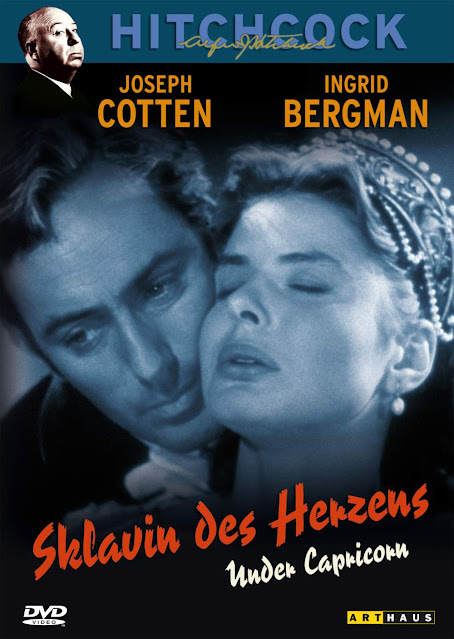Director: Alfred Hitchcock
Ingrid Bergman, Joseph Cotten, Michael Wilding, Margaret Leighton, Cecil Parker, Denis O'Dea, Jack Watling, Harcourt Williams, John Ruddock, Bill Shine.
Transatlantic Pictures (Hitchcock's own production company) must've rubbed their hands with glee when they decided to co-produce this film with Warner Bros. For not only did they have the world's leading female actress (Ingrid Bergman) in their film, they also had gifted stars Joseph Cotten, Michael Wilding and Margaret Leighton lending support, and naturally the great Alfred Hitchcock at the helm. If ever a film was sure to be a critical and commercial hit, Under Capricorn was it. Such a shame, then, that Under Capricorn emerged as the worst film of Hitchcock's career. The critics roasted it, the public ignored it, and Transatlantic Pictures went bust. Irish aristocratic lady Henrietta (Bergman) elopes to Australia with her cruel lover Sam Flusky (Cotten). She gradually develops the illness dipsomania, what with her lover controlling her every move with over-bearing authority and their maid Milly (Leighton) plying her with drink. A childhood friend of Henrietta's, Charles Adare (Wilding) turns up and, realising pretty quickly that all is not well, tries to help her regain a sense of stability. The film is a laughably overwrought costume melodrama, totally ill-suited to Hitchcock's playful, suspenseful directing style. A year previously, the director had made the thriller Rope, using experimental ten minute takes, and in this film he still seems to be in the habit of allowing scenes to go on and on (maybe not ten minutes, but some bits last for six or seven minutes without a single cut). Frequently, the film feels tediously unspooled as a result. The actors seem to over-act much of the time, but it's hard to see how they could've avoided this as much of the screenplay requires them to handle some horribly overripe dialogue and reactions. Under Capricorn is undoubtedly the least interesting film that Hitchcock ever made. Those who try to persuade us that it is a misunderstood masterpiece are, I'm sorry to report, well and truly kidding themselves.










































No comments:
Post a Comment